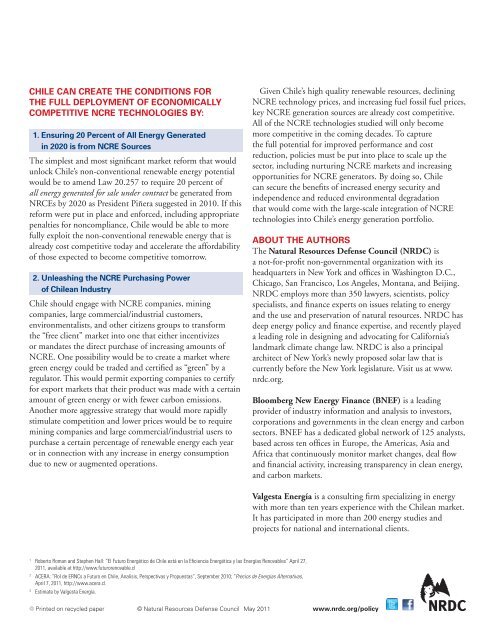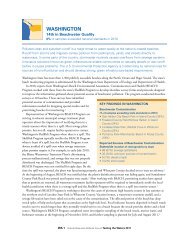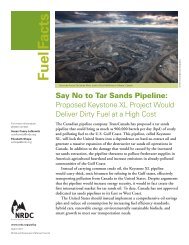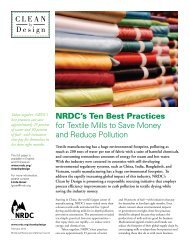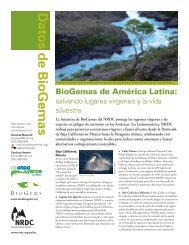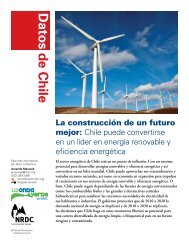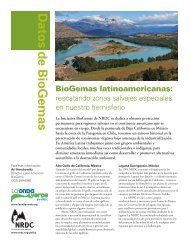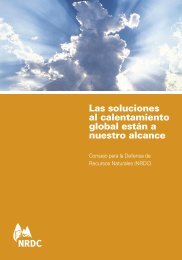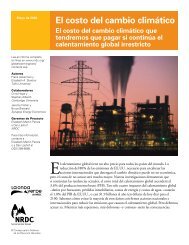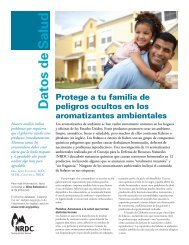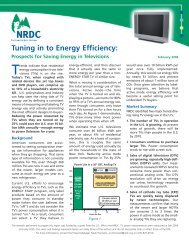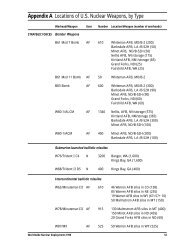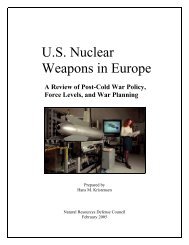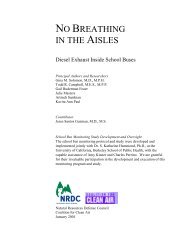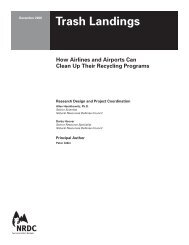Chile FActS - Natural Resources Defense Council
Chile FActS - Natural Resources Defense Council
Chile FActS - Natural Resources Defense Council
You also want an ePaper? Increase the reach of your titles
YUMPU automatically turns print PDFs into web optimized ePapers that Google loves.
chile cAN cReAte the coNDitioNS FoR<br />
the Full DePloyMeNt oF ecoNoMicAlly<br />
coMPetitive NcRe techNologieS By:<br />
1. ensuring 20 Percent of All energy generated<br />
in 2020 is from NcRe Sources<br />
The simplest and most significant market reform that would<br />
unlock <strong>Chile</strong>’s non-conventional renewable energy potential<br />
would be to amend Law 20.257 to require 20 percent of<br />
all energy generated for sale under contract be generated from<br />
NRCEs by 2020 as President Piñera suggested in 2010. If this<br />
reform were put in place and enforced, including appropriate<br />
penalties for noncompliance, <strong>Chile</strong> would be able to more<br />
fully exploit the non-conventional renewable energy that is<br />
already cost competitive today and accelerate the affordability<br />
of those expected to become competitive tomorrow.<br />
2. unleashing the NcRe Purchasing Power<br />
of chilean industry<br />
<strong>Chile</strong> should engage with NCRE companies, mining<br />
companies, large commercial/industrial customers,<br />
environmentalists, and other citizens groups to transform<br />
the “free client” market into one that either incentivizes<br />
or mandates the direct purchase of increasing amounts of<br />
NCRE. One possibility would be to create a market where<br />
green energy could be traded and certified as “green” by a<br />
regulator. This would permit exporting companies to certify<br />
for export markets that their product was made with a certain<br />
amount of green energy or with fewer carbon emissions.<br />
Another more aggressive strategy that would more rapidly<br />
stimulate competition and lower prices would be to require<br />
mining companies and large commercial/industrial users to<br />
purchase a certain percentage of renewable energy each year<br />
or in connection with any increase in energy consumption<br />
due to new or augmented operations.<br />
1 Roberto Roman and Stephen Hall: “El Futuro Energético de <strong>Chile</strong> está en la Eficiencia Energética y las Energías Renovables” April 27,<br />
2011, available at http://www.futurorenovable.cl<br />
2 ACERA: “Rol de ERNCs a Futuro en <strong>Chile</strong>, Analisis, Perspectivas y Propuestas”, September 2010; “Precios de Energias Alternativas,<br />
April 7, 2011, http://www.acera.cl.<br />
3 Estimate by Valgesta Energía.<br />
Given <strong>Chile</strong>’s high quality renewable resources, declining<br />
NCRE technology prices, and increasing fuel fossil fuel prices,<br />
key NCRE generation sources are already cost competitive.<br />
All of the NCRE technologies studied will only become<br />
more competitive in the coming decades. To capture<br />
the full potential for improved performance and cost<br />
reduction, policies must be put into place to scale up the<br />
sector, including nurturing NCRE markets and increasing<br />
opportunities for NCRE generators. By doing so, <strong>Chile</strong><br />
can secure the benefits of increased energy security and<br />
independence and reduced environmental degradation<br />
that would come with the large-scale integration of NCRE<br />
technologies into <strong>Chile</strong>’s energy generation portfolio.<br />
ABout the AuthoRS<br />
The <strong>Natural</strong> <strong>Resources</strong> <strong>Defense</strong> <strong>Council</strong> (NRDC) is<br />
a not-for-profit non-governmental organization with its<br />
headquarters in New York and offices in Washington D.C.,<br />
Chicago, San Francisco, Los Angeles, Montana, and Beijing.<br />
NRDC employs more than 350 lawyers, scientists, policy<br />
specialists, and finance experts on issues relating to energy<br />
and the use and preservation of natural resources. NRDC has<br />
deep energy policy and finance expertise, and recently played<br />
a leading role in designing and advocating for California’s<br />
landmark climate change law. NRDC is also a principal<br />
architect of New York’s newly proposed solar law that is<br />
currently before the New York legislature. Visit us at www.<br />
nrdc.org.<br />
Bloomberg New Energy Finance (BNEF) is a leading<br />
provider of industry information and analysis to investors,<br />
corporations and governments in the clean energy and carbon<br />
sectors. BNEF has a dedicated global network of 125 analysts,<br />
based across ten offices in Europe, the Americas, Asia and<br />
Africa that continuously monitor market changes, deal flow<br />
and financial activity, increasing transparency in clean energy,<br />
and carbon markets.<br />
Valgesta Energía is a consulting firm specializing in energy<br />
with more than ten years experience with the <strong>Chile</strong>an market.<br />
It has participated in more than 200 energy studies and<br />
projects for national and international clients.<br />
Printed on recycled paper © <strong>Natural</strong> <strong>Resources</strong> <strong>Defense</strong> <strong>Council</strong> May 2011 www.nrdc.org/policy


